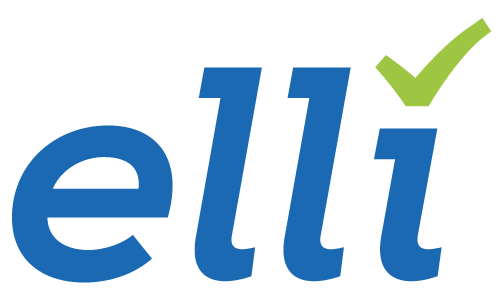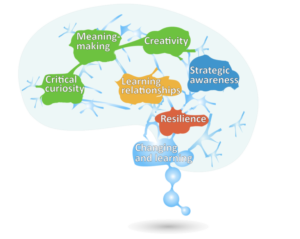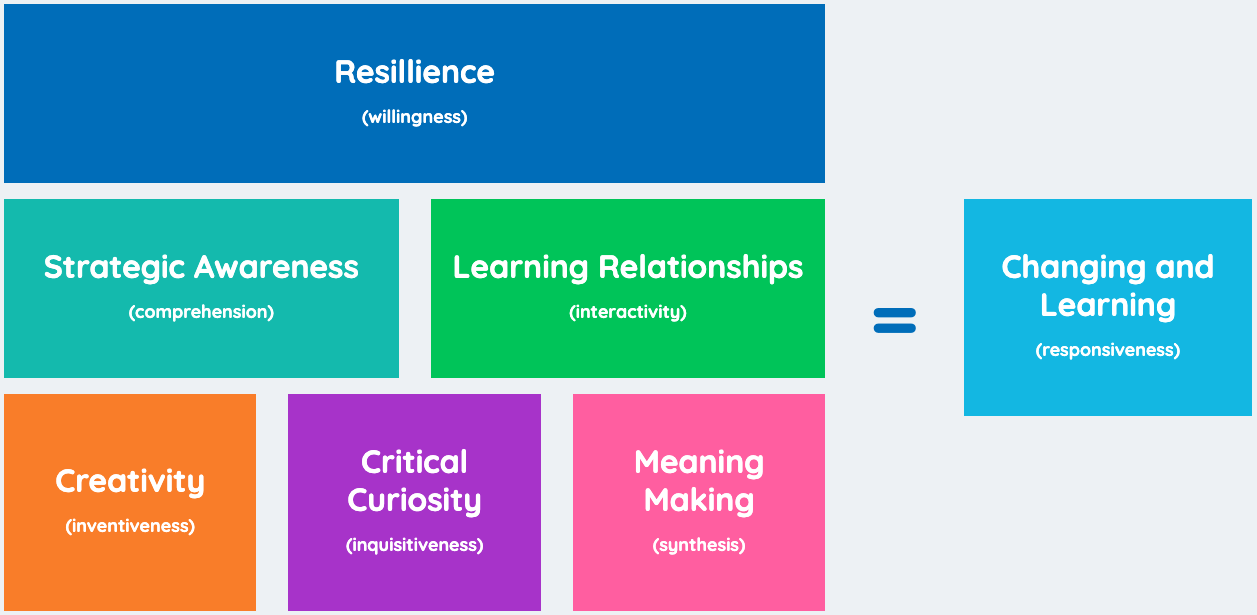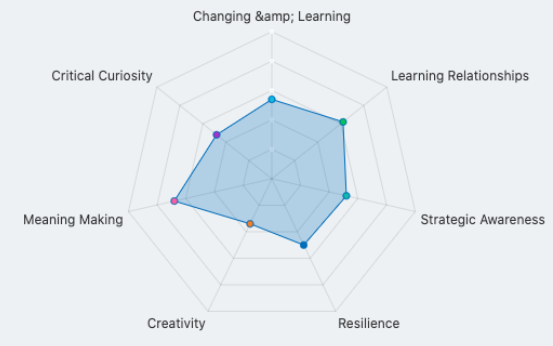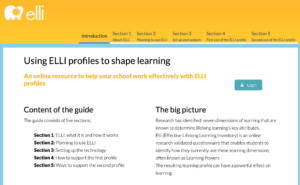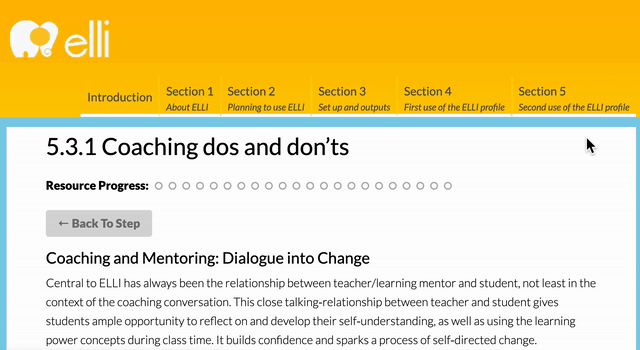Introducing ELLI
TLO is delighted to be able to offer you ELLI … the instrument that assesses and tracks Learning Power.
TLO’s work on building students’ Learning Power stems from the original 7 dimensions that were first confirmed in the ELLI research more than 20 years ago. Over the years, TLO has amplified the dimensions into a set of dispositions, habits and behaviours that give the dimensions greater substance for teachers as they work to improve classroom practice.
We now offer schools this unique way of discovering and tracking learning; the gateway to successful learning.
Welcome to ELLI … now available to TLO’s customers.
Here's how ELLI's 7 dimensions become BLP's 17 learning habits
How 7 dimensions become 17 learning habits
The idea of Learning Power has been a feature of education for more than 20 years and there are many ways of deconstructing it. Learning Power began its journey in research undertaken at the University of Bristol led by Professor Patricia Broadfoot and Professor Guy Claxton.
This research into learning sought to capture the essence and meaning of Learning Power and identified 7 critical dimensions of Learning Power. These dimensions can be viewed more like attitudes or dispositions rather than capabilities or skills.
Seven dimensions of learning
The seven dimensions are:
- Changing and Learning
– our disposition to grow as a learner - Critical Curiosity
– our disposition to ask questions to ‘get to the bottom of it’ - Meaning Making
– our disposition to make connections between past information / experience and new knowledge - Creativity
– our disposition to think ‘outside the box’ - Resilience
– our disposition to be robust when the going gets tough - Strategic Awareness
– our disposition to be aware of and in control of our learning - Learning Relationships
– our disposition to learn with and from others
- Changing and Learning
From Learning Power to Building Learning Power
Learning Power’s premise is that learning can be learned; it is a learnable craft. However, the seven dimensions that have become the pillars of ELLI’s assessment practice needed to be translated into the language of schools.
Firstly, the seven dimensions were divided into four major Learning Power dispositions, often known as ‘the 4Rs’:
- Resilience – broadly concerned with the emotional aspects of learning
- Resourcefulness – broadly concerned with the cognitive aspects of learning
- Reciprocity – broadly concerned with the social aspects of learning
- Reflection – broadly concerned with the meta-cognitive aspects of learning
Linking Learning Power to the broad aspects of learning theory (cognitive, emotional, social, meta-cognition) helped teachers to get to grips with the issues.
Secondly, the 4R dispositions were deconstructed to reveal 17 Learning Power behaviours, sometimes known as ‘learning muscles’. These named behaviours —such as Listening, Reasoning, or Planning — were drawn from many of the items in the rich lists of principal characteristics of the seven dimensions. Because these behaviours are specific in nature they can be individually trained, nurtured and exercised. This deconstruction serves to broaden and strengthen the language of learning, with particular reference to school settings. Using and extending the language of learning in this way adds breadth and depth to how teachers and learners talk about, understand and become, better learners.
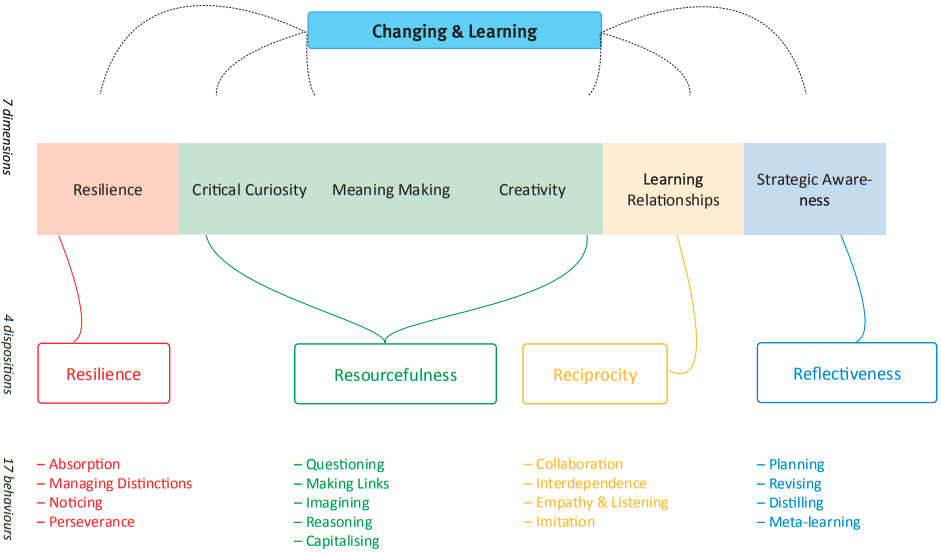
1. Where ELLI comes from.
ELLI (Effective Lifelong Learning Inventory) assesses Learning Power. It has been research-validated, both academically and operationally, among more than 100,000 people globally from all walks of life but most particularly among schoolchildren grappling to understand how they learn and thereby, improve their performance.
2. What ELLI does.
ELLI (Effective Lifelong Learning Inventory) is a valuable tool that can tell teachers how their learners are currently disposed to learn, how strong they feel their learning dispositions to be, how their learning dispositions work together to make up the current learner. ELLI offers a unique picture of how a student sees themselves as a learner. This saves teachers lengthy observation time or guesswork they would otherwise need to make a judgement. And the really clever bit is that re-taking the questionnaire enables teachers to check and track the progress learners are making as a result of teachers’ use of learning language and classroom interventions.
Key merits of ELLI
it offers students a profile of their current learning dispositions
- it stimulates students’ interest in themselves as leaners
it saves teachers’ time and guesswork
it tracks learners’ progress that result from self-knowledge and teacher interventions
3.What ELLI gives you
ELLI tracks changes in your students’ profiles as their responsiveness to learning changes AND it is highly sensitive to the learning environment. It doesn’t pigeon-hole the student learner but their learning profile changes with them.
Student Engagement
Input: students answer an on-line questionnaire. Each question has only 4 possible, repeated answers, ∙ very like me ∙ quite like me ∙ a little like me ∙ not like me.
Output: an immediate, but simple, spidergraphic with a student-friendly single page explanation. Students can then learn more about their profile by discussing it with one another and their teachers.
4. The hidden benefits that ELLI offers.
A Learning Power profile provides the basis for learning focused learning conversations. Use of Elli encourages a school to design a curriculum to give students opportunities to stretch and develop all of their learning dimensions. ELLI makes it possible to capture hard-to-reach data in its profiles, giving schools evidence of students’ growth in self-regulation, independence, confidence and resilience.
On the staffing side the ELLI profile can greatly enhance and future proof the school’s staff selection process, finding employability dispositions to ensure successful candidates thrive and contribute to the school’s learning culture. Elli also supports induction and performance management and staff development.
Key Issues
Learning power profiles provide;
- the basis for high quality coaching
- the focus for a student’s development plan
- the impetus to design a curriculum that gives students opportunities to develop their learning dimensions
- hard to reach data and evidence of students’ growth in self-regulation, independence, confidence and resilience
- part of the staff selection process
- evidence of changing learning habits amongst staff
A framework for a Learning Power conversation
Termly or twice yearly conversations about the learning profiles can be a cornerstone of developing and assessing Learning Power. After taking the ELLI questionnaire, students enter into a coaching conversation with a teacher/coach. During this conversation they are encouraged to think about how they might make their use of a dimension stronger, broader and deeper.
Where the student is showing hardly any use of a learning dimension the teacher’s coaching prompts encourage a discussion on:
- exploring the meaning of the learning dimension
- thinking about why the dimension is/will be useful to them
- gauging what would help them to use it more often
Where students are showing some use of a dimension the coaching prompts focus the discussion on:
- deepening understanding of that learning dimension
- trying to remember to use it in different domains
- exploring the benefits they might gain from using it
- seeking out what could trigger them to use it more broadly
This is a critical stage. Exploring what triggers the use of a learning dimension begins to nudge casual or reflex use into deliberately strengthening and broadening the habit of using it.
Where students are already showing strong use of the dimension, the coaching-prompts might encourage:
- seeking examples that validate the ELLI profile’s judgement of strong use
- talking in more depth about the dimension in action
- exploring how they can become even more skilled in using it
- probing what triggers its use
- discovering where else it might be useful.
Such conversations tend to deepen teacher-student relationships, help develop the common language for learning, and invigorate students’ interest in their Learning Power.
5. All this AND you also get help to use ELLI productively OR All this AND you can opt to add . . .
A substantial practical online resource to help schools;
- understand more about ELLI
- plan how to use ELLI to best advantage
- set up ELLI and retrieve the results
- understand, interpret and coach students’ first ELLI profile
- to help students raise their own learning game
- support teachers to shift to learning friendly classroom practice
- understand, interpret and enhance practice based on a second profile.
Using Elli profiles to shape learning
An online resource
Would you like a free trial?

